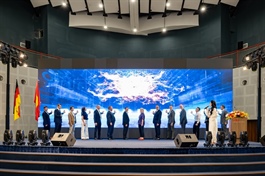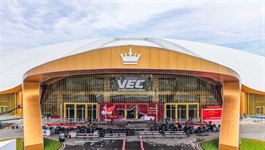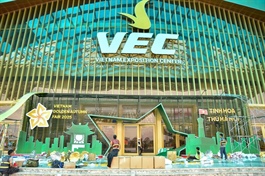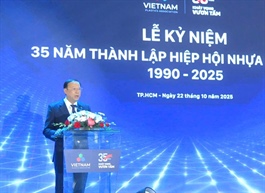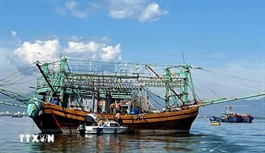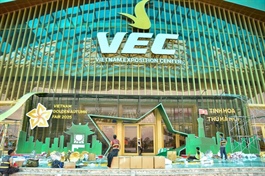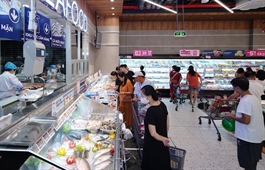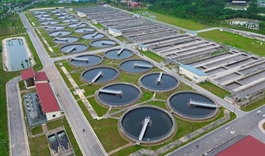ReCoPro strengthens sustainable cocoa farming in Vietnam
ReCoPro strengthens sustainable cocoa farming in Vietnam
Stakeholders from across Vietnam's cocoa value chain gathered in Dak Lak province to assess progress and chart the next phase of sustainable cocoa production.
|
On October 22, Puratos Grand-Place Vietnam and the German Development Agency (GIZ) co-organised the closing workshop of the 'Regenerative Cocoa Production to Support Livelihood Development in Vietnam' (ReCoPro) project in Buon Ma Thuot city, Dak Lak province. The event brought together 50 participants from government agencies, international organisations, the private sector, and farmer cooperatives to review key achievements, share lessons learned, and discuss the future of regenerative cocoa development in Vietnam.
ReCoPro's aim was to promote regenerative farming and agroforestry in cocoa plantations by supporting farmers to plant forest and fruit trees alongside cocoa. Shifting away from monoculture, these trees provide essential shade for the shade-loving cocoa, while also diversifying household income and increasing their resilience against climate change impacts. In the past, farmers were often unfamiliar with forest trees and tended to clear them to grow fruit trees. However, through training and field demonstrations, they now recognise that, under a changing climate, forest trees play a vital role in improving soil health, maintaining shade for cocoa, increasing biodiversity, and ensuring the long-term sustainability of their farms.
The initiative provided nearly 90,000 seedlings to 300 farmers, based on experts' reviews of the farmers' conditions, followed by technical advice and monitoring. In addition, 88 training sessions and field demonstrations were held for more than 2,000 participants, helping farmers adopt regenerative agricultural practices, farm management, and business development.
Techniques introduced under the project have shown clear technical and economic benefits. For instance, the adoption of drip irrigation has helped farmers cut water use by up to 30 per cent while improving fertiliser efficiency through fertigation, the application of nutrients via the irrigation system, and significantly reducing labour requirements for irrigation and fertilisation.
Farmers have also been trained to convert agricultural residues such as cocoa husks, leaves, and other organic by-products into compost, improving soil fertility and lowering input costs. These regenerative practices enable cocoa trees to thrive amid shifting climate conditions while supporting sustainable agriculture and environmental protection.
Eight demonstration farms were established in Dak Lak and Lam Dong provinces, equipped with drip irrigation systems and composting facilities. Farmers were regularly visited by experts with monitoring and technical advice on regenerative practices such as composting using cocoa pods and cow manure, applying microbial solutions such as compost tea and Trichoderma fungi for pest and soil management, and raising weaver ants as a natural pest control.
These demonstration sites have delivered measurable improvements in productivity, cocoa quality, and environmental outcomes. In particular, two demo gardens in Ea Kar, Dak Lak have increased their wet bean yield by 1.5 times compared to before the application of generative farming methods (from 2023 to 2025) and to other traditional production gardens.
Beyond farming practices, ReCoPro also strengthened farmers’ business skills. Cooperatives received support in marketing, e-commerce, and branding. Farmers learned to promote their products on digital platforms, improve packaging to meet market demands, and build stronger cooperative brands. This combination of technical and business support has enhanced market access and increased farmers’ confidence and income stability.
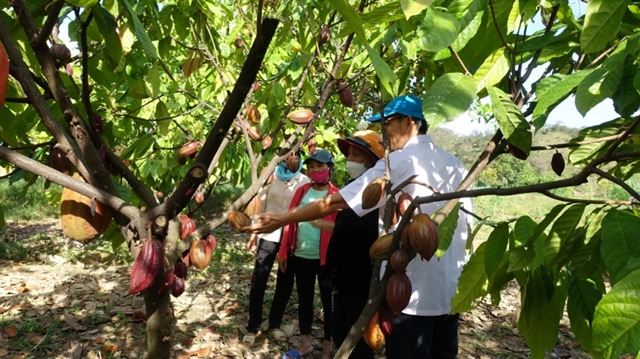
Local farmers visit a ReCoPro project |
“ReCoPro shows how resilient and climate-friendly cocoa farming can increase productivity and income for farmers while contributing to the climate agenda,” said Daniel Herrmann, head of Climate Policy at GIZ Vietnam. “The lessons learned here will help shape future initiatives that scale regenerative farming practices and empower more farmers to take part in Vietnam’s green transition.”
Women were explicitly encouraged to participate in training and cultivation activities, contributing to both household income and community development. Their role in cocoa farming was considered in the development of the practices. Representatives from the Nhat Tam Cooperative - a local organisation supported by the project - shared that women’s active participation has led to improved household livelihoods and stronger leadership.
The scheme also explored initial elements of a community carbon financing scheme to compensate farmers for efforts to reduce greenhouse gas emissions. Under this initiative, farmers received incentive payments of around VND3,000-4,000 (28 US cent) per living tree at the first and second monitoring phases.
"We partner with GIZ because we share the same vision. A cocoa value chain that is not only productive but also regenerative, inclusive, and future-proof," said Justin Jacquat, regional cocoa manager, Asia-Pacific Puratos Grand Place.
"Beyond productivity, we also build on farmers’ knowledge. We improve traceability and establish the foundation for deforestation-free cocoa in line with upcoming European Union regulations. Wherever Cocoa Trace operates, we make a long-term value commitment, meaning we guarantee farmers that we will purchase their beans consistently," he added.
ReCoPro marks an important milestone in advancing sustainable cocoa production in Vietnam. The project illustrates how collaboration across the supply chain can generate lasting economic, social, and environmental value, while demonstrating the power of regenerative practices and inclusive business models to build a more resilient and competitive cocoa sector. By promoting climate-smart agriculture and empowering local communities, ReCoPro has laid the groundwork for a sustainable cocoa value chain that supports both people and the planet.
The initiative, co-funded by the German government and Puratos Grand-Place Vietnam, has been jointly implemented by GIZ and Puratos Grand-Place Vietnam since November 2021. Running through November 2025, it focuses on promoting sustainable cocoa farming across Dak Lak and Lam Dong provinces.
ReCoPro aims to strengthen small-scale cocoa farmers’ adaptive capacity to climate change and improve income generation while embedding sustainable, environmentally friendly farming practices in local communities. Its focus areas include climate-resilient cocoa agroforestry systems, diversified farm incomes, scalable sustainable cocoa sourcing, and a community-based carbon finance mechanism.
To achieve these goals, ReCoPro works across four areas. First, it promotes regenerative agroforestry through site-specific models, planting cocoa seedlings and shade trees, monitoring progress, establishing demonstration plots, and producing technical guidelines. Second, it builds technical capacity through training, workshops, and farmer field days. Third, it enhances livelihoods and resilience by supporting diversified income streams. Finally, it develops a framework for community carbon finance, including bonus incentives for surviving seedlings and guidance for accessing the voluntary carbon market at the local level.
- 17:10 24/10/2025







